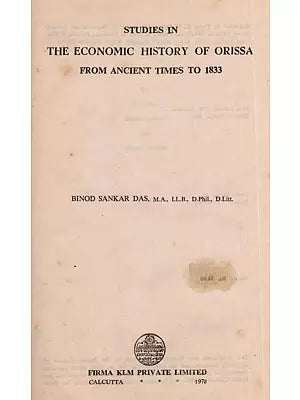Studies in the Economic History of Orissa from Ancient Times to 1833 By Binod Sankar Das
Studies in the Economic History of Orissa from Ancient Times to 1833 By Binod Sankar Das
Hardcover
Couldn't load pickup availability
Book Description -
Introduction
Throughout the nineteenth century a question has often been asked on the Economic History of India: What was the true nature of and sequel to the foundation of the British Raj in India ? Those who maintained the conception of "traditional India" held that India's subsistence economy in the pre-British period was 'static and self-contained'. To them, the consequences of the British rule were rapid destruction of village level handicrafts, steady decadence of agriculture and continuous frustration of the industrial enterprises. But scholars like G. F. Shirras, Vera Anstcy and others refuse to accept the popularly known "drain theory", and attribute the failure of the Indian economy to respond to the warming influences of the Industrial Revolution, to somo inherent limitations of the Indian society.
They have, however, failed to notice the exploitative nature of the British rule, put undue emphasis on the beneficial character of the Raj and blamed natural hindrances like floods, low productivity of the soil as impediments to industrial development. The argument that India's failure to industrialise was due to the brevity of the gestation period is unconvincing because of the absence of adequate region-wise historical research and non- availability of the economic data to prove India's backwardness on the regional basis.
It is this necessity to study the available economic data of a particular region to test the above-mentioned arguments for India's backwardness that has prompted the scholars to study the economic history of Orissa as a typical case. The case study of Orissa may be undertaken in the context of economic developments taking place all over India since the 17th century. Moreover, region-wise analysis of economic phenomena would prompt scholars to trace the evolution of ancient institutions associated with the agrarian economy and prevalent religioethical norms which took their modern shape during the formative phases of British rule in India.
Share


